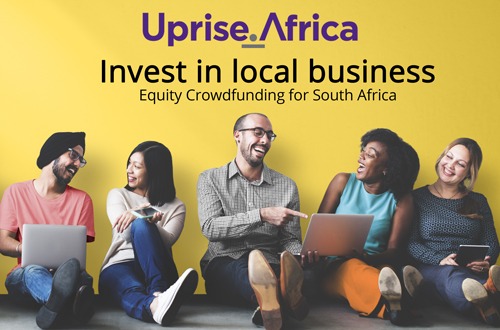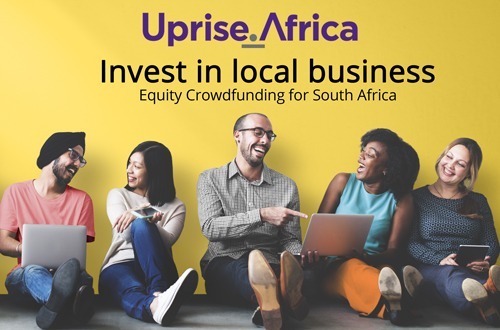
Equity crowdfunding, which allows private individuals to invest in early-stage businesses in exchange for equity, is an accepted alternative funding model in countries like the US, UK and Australia, however, in South Africa, uptake of this model continues to lag.
Uprise.Africa, is hoping to change this. They are the country’s first equity crowdfunding platform and their goal is to enable everyone to invest in startups, not just professional investors.
The model works to close the “missing middle” funding gap that exists for small and medium-sized businesses (SMEs) in the country. In addition to linking investors with startups, the platform will also serve as a space for small business owners to receive feedback from investors, get help reaching their target market, and test the viability of their offering.
Inge Prins, CMO of Uprise.Africa says they are looking to launch their first six deals within sectors like the food and drinks sector. Local pub and restaurant Beerhouse is expected to be among the platform’s first six deals with the restaurant chain expected to use the platform to fund the launch of its next outlet.
The founders of Uprise.Africa is global entrepreneurs Tabassum Qadir (CEO) and Patrick Schofield (also company COO) who previously launched crowdfunding platforms BackaBuddy, which has raised more than R46 million and one of the country’s leading crowdfunding platforms, ThundaFund, which has helped raise over R15 million.
More South Africans are familiar with crowdfunding platforms like Thundafund which do not allow for the transfer of ownership and contributions are “generally donation or gift-based”. According to an Inc. article, this model is particularly effective for getting market validation.
Crowdfunding is often used as a promotional marketing tool to sell your product. It’s a great way to validate demand in the marketplace for your product.”
An Underused Funding Alternative
According to the African Crowdfunding Association (ACA) there is a lack of clarity in the regulation of equity crowdfunding in South Africa.
The Financial Services Board, which oversees the non-banking financial services industry in the public’s interest, has not crafted any regulations around equity crowdfunding. “Regulatory areas of concern surrounding crowdfunding are issues such as money laundering and consumer protection,” writes Kevin Allen, director of the ACA.
While not illegal, the lack of certainty means there is no encouragement or protection for investors, making equity crowdfunding a less attractive investment option.
Subsequently, both entrepreneurs and the economy miss out on the benefits that this funding model offers, says Prins.
“If you look at somewhere like the UK where last year 21% of all venture capital went through the two largest equity platforms Crowdcube and Seedrs then actually pulling all the capital from all the traditional models like VC’s, firms alike investing into the platforms it’s going to help grow the market and also support entrepreneurs’ needs,” says Prins
Want to know how Uprise.Africa is aiming to solve SA’s funding dilemma? SME South Africa talks to Prins about their launch and navigating the crowdfunding regulation minefield.
Q: When is Uprise.Africa set to launch?
We are in the process of being ready. We are launching on 25 October, and are in the process of recruiting entrepreneurs.
Q: What will the rollout look like?
We’re looking for six launch projects and at the moment we’re engaging what ecosystems there are to ensure that we leverage the way we get stuck in. We are ensuring that we consult and speak with all stakeholders so that it’s inclusive, and ensuring that we can benefit the ecosystem. So we’re having conversations, building relationships and just getting ready for our launch.
Q: In what countries do you currently operate, and is expansion on the cards?
So currently we only cater to South African businesses. We are definitely at a later stage looking into building in [the rest of] Africa and looking at gateways outside of Africa, but for the initial launch, it will have a South African focus.
Q: How does your platform help to solve SA’s funding challenges?
We believe that it’s important that funding be more accessible to SMEs. One of the great challenges SMEs face is access to funding.
So as Uprise.Africa we believe in empowering people, we believe in the future for businesses. We want to allow more to grow, but you need platforms that allow ideas and people to be able to speak on their own and be able to access networks and funding. Currently, the ecosystem can be quite fragmented, access to the right people can be quite challenging and it’s hard work for entrepreneurs.
Uprise. Africa strives to be a platform that gives entrepreneurs access to the ecosystem, supports them through the process and allows their ideas to stand on their strength. We are a platform that is built on accessibility for both the investor and entrepreneur alike.
[We aim for] trust and transparency, how the deal is set up, making sure all parties are protected through the legal and compliance aspects.
Q: Why equity crowdfunding?
Most people who start new businesses in the beginning use their capital, take out loans, and network with friends, family and people that they know. Many South Africans don’t have access to either equity crowdfunding or friends and family networks to give them access to viable funding options.
So what equity crowdfunding does and creates the opportunity for, is it gives entrepreneurs access to [a platform] to pitch their ideas, verbalise why their idea is viable to broaden their audience [they want to target], and let that idea, the way it’s pitched, basically on its merit, get access to funding.
So it’s pretty much letting the ideas stand on their own feet and seeing what the crowd thinks and if it’s worthwhile to invest in.
Q: Who is the typical Uprise? Africa investor?
It’s going to be an interesting collection of people. We are looking for people who can invest. [We are] advising people in terms of affordability, so making sure that we’re responsible in that space and making sure that we also inform people about the risks involved.
We also have projects for every man or woman. It [offers] the opportunity for everyday South Africans, across the board, to invest in businesses that they believe in.
[Who can invest] is all dependent on the project and what projects are more applicable to a certain kind of investor.
Q: Regulations around equity crowdfunding are still very murky, how are you navigating this?
So the current landscape and regulations have made it difficult to enter the equity crowdfunding space. What we’ve done is spend a lot of time with our legal team and compliance team and engage with them on the model that would allow us to be legal and compliant within the current structure, and we are constantly engaging with them.






